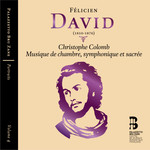|
Back
07/26/2021
“Portraits” – Volume 4
Félicien David: Christophe Colomb [1] – La Perle du Brésil: “Ouverture” [2] – Le Jugement dernier [3] – Symphonie n° 3 in E-Flat major [4] – Six Motets [5] – Mélodies [6] – Trio n° 1 in E-Flat major for violin, cello and piano [7] – Music for piano [8]
Chantal Santon-Jeffery [1] (soprano), Julien Behr [1], Cyrille Dubois [6] (tenor) [1], Josef Wagner [1] (baritone), Jean-Marie Winling [1] (narrator), François Saint-Yves [5] (organ), Jonas Vitaud [8], Tristan Raës [6], David Violi [7] (piano), Pascal Monlong [7] (violin), Pauline Buet [7] (cello), Flemish Radio Choir [1, 3, 5], Les Siècles [1], Brussels Philharmonic [2, 3, 4], François-Xavier Roth [1] (conductor), Hervé Niquet [2, 3, 4, 5] (chorus master, conductor)
Recording: l’Opéra Royal du Château de Versailles, France (December 12 and 13, 2014) [1], KVS, Brussels, Belgium (June 22, 2016 [2], June 17 and 20, 2016 [3], June 20 and 21, 2016 [4]), Jezuïetenkerk, Heverlee, Leuven, Belgium (April 19 and 20, 2016) [5], Palazzetto Bru Zane, Venice, Italy (April 11, 2016 [6], November 22 and 23, 2015 [7], October 30, 2015 [8]) (World Premiere Recording) – 231’35
Three CDs Ediciones Singulares ES 1028 (Distributed by Naxos of America) – Book in French and English

   
“[Félicien] David was a sincere artist; he never sought easy success and did not waste his talent: he lived as a poor man and his memory has a right to respect.”
Camille Saint-Saëns
Probity and modesty closely capture Félicien David’s temperament. Perhaps these traits were buried inside his character due to the death of his father when David was only six years old, leaving him an orphan. Having been swept up in the Saint Simonian movement, this mapped a pathway into travels to the Orient. Such exotica permeated his music throughout a wide range of genres and never relinquished. Ediciones Singulares’ Volume 4 inside the “Portraits” gallery is a supreme way of experiencing World Premiere Recordings, canvassing eight different disciplines of music, each holding extraordinary strength.
If one isn’t familiar with David, the first stop would be to experience his profound ode-symphonie, Le Désert in which spoken dialogue commingled with orchestral flourishes, a technique co-authored with Hector Berlioz. His Christophe Colomb follows the same inventive formula with its journey to the New World with an understated demeanor. David succeeded in scoring the Italian-born explorer and natives with civility, as presented in the text in Part Four, “...Let us respect all their rights and make their days prosperous.” Of note is the “Air de Ballet”...the “Danse de sauvages” with its freshly fast and snappy tempo, anticipating his opéra-comique of 1862, Lalla Roukh. One can also hear similar stylizations inside David’s “Ouverture” from his first opera, La Perle du Brésil (1851).
David’s later, weightier opera, Herculanum, had an “Apotheosis” which was suddenly sidelined just prior to its 1859 Paris Opéra premiere. Now, we discover a "New World" wonder: broken down into two choirs (the damned and the redeemed), Hervé Niquet directs the Flemish Radio Choir in a fitting, powerful conclusion to this tragic opera. If the crowning end to the original score wasn't magnanimous enough, this final closing is a stunner. The immensity of David's music hearkens back to a mighty Berlioz, through in this particular œuvre the elements of Eastern gusto are scuttled.
Félicien David was truly France’s 19th century “Renaissance Man”, a veritable “unsung hero”: his music can touch a listener’s ear with imposing delicacy. Such is the case when he branched out to sacred Motets, those sung by selected ‘apostles’ [members]...part of the modus operandi found inside the walls of Saint-Simonian’s Ménilmontant Retreat, on the outskirts of Paris.
The music never bogs down the listener. Light effervescence is in full throttle during the four movement, Symphony n° 3. Though not as hefty as, perhaps, Beethoven or even Haydn, the Brussels Philharmonic rendition shapes and brings forth the spritely cadences and light finishes of the score with an overlapping of music as it weaves between orchestral sections.
Cyrille Dubois, one of the foremost translators of Félicien David, takes the spotlight in a delightful recital of Mélodies, set upon verses of various French poetic writers. Here, elements of foreign travels seep into the song lines with aesthetically artful constructs. Intimacy and pure joy flourish during the Trio in E-Flat major. Jonas Vitaud’s expressive piano comfortably settles inside David’s six lusciously unfussy salon pieces with Frédéric Chopin reminisces (i.e. “Doux souvenirs”) wafting distantly in the background. Engaging.
Félicien David’s name will carry on in demure fashion...let his music be your guide.
Palazzetto Bru Zane Website
Christie Grimstad
|